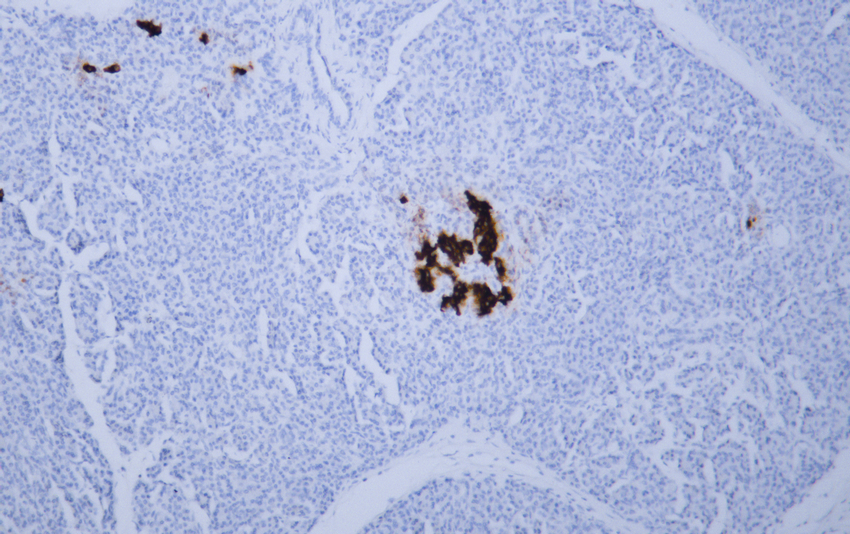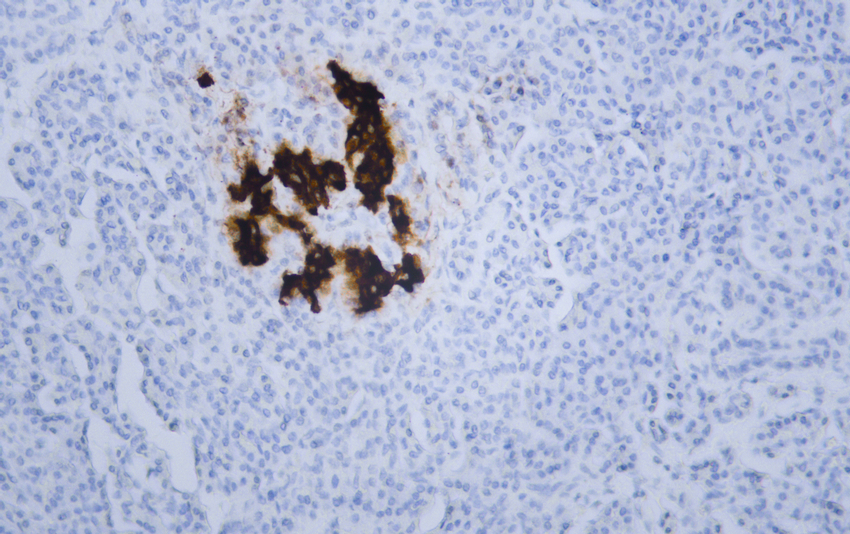Insulin (PT2015) mouse mAb
- Catalog No.:YM6638
- Applications:IHC;ELISA
- Reactivity:Human;Mouse;Rat;
- Target:
- Insulin
- Fields:
- >>MAPK signaling pathway;>>Ras signaling pathway;>>Rap1 signaling pathway;>>cGMP-PKG signaling pathway;>>HIF-1 signaling pathway;>>FoxO signaling pathway;>>Phospholipase D signaling pathway;>>Oocyte meiosis;>>Autophagy - animal;>>mTOR signaling pathway;>>PI3K-Akt signaling pathway;>>AMPK signaling pathway;>>Longevity regulating pathway;>>Longevity regulating pathway - multiple species;>>Regulation of actin cytoskeleton;>>Insulin signaling pathway;>>Insulin secretion;>>Ovarian steroidogenesis;>>Progesterone-mediated oocyte maturation;>>Prolactin signaling pathway;>>Regulation of lipolysis in adipocytes;>>Type II diabetes mellitus;>>Insulin resistance;>>Non-alcoholic fatty liver disease;>>Type I diabetes mellitus;>>Maturity onset diabetes of the young;>>Aldosterone-regulated sodium reabsorption;>>Alzheimer disease;>>Prostate cancer;>>Diabetic cardiomyopathy
- Gene Name:
- INS
- Protein Name:
- Insulin [Cleaved into: Insulin B chain; Insulin A chain]
- Human Gene Id:
- 3630
- Human Swiss Prot No:
- P01308
- Immunogen:
- Synthesized peptide derived from human Insulin AA range: 25-110
- Specificity:
- The antibody can specifically recognize human Insulin protein.
- Formulation:
- PBS, 50% glycerol, 0.05% Proclin 300, 0.05%BSA
- Source:
- Mouse, Monoclonal/IgG2b, kappa
- Dilution:
- IHC 1:200-400. ELISA 1:500-5000
- Purification:
- The antibody was affinity-purified from ascites by affinity-chromatography using specific immunogen.
- Storage Stability:
- -15°C to -25°C/1 year(Do not lower than -25°C)
- Molecular Weight(Da):
- 12kD
- Observed Band(KD):
- 9kD
- Background:
- After removal of the precursor signal peptide, proinsulin is post-translationally cleaved into three peptides: the B chain and A chain peptides, which are covalently linked via two disulfide bonds to form insulin, and C-peptide. Binding of insulin to the insulin receptor (INSR) stimulates glucose uptake. A multitude of mutant alleles with phenotypic effects have been identified. There is a read-through gene, INS-IGF2, which overlaps with this gene at the 5' region and with the IGF2 gene at the 3' region. Alternative splicing results in multiple transcript variants. [provided by RefSeq, Jun 2010],
- Function:
- disease:Defects in INS are the cause of familial hyperproinsulinemia [MIM:176730].,function:Insulin decreases blood glucose concentration. It increases cell permeability to monosaccharides, amino acids and fatty acids. It accelerates glycolysis, the pentose phosphate cycle, and glycogen synthesis in liver.,function:Preptin undergoes glucose-mediated co-secretion with insulin, and acts as physiological amplifier of glucose-mediated insulin secretion. Exhibits osteogenic properties by increasing osteoblast mitogenic activity through phosphoactivation of MAPK1 and MAPK3.,function:The insulin-like growth factors possess growth-promoting activity. In vitro, they are potent mitogens for cultured cells. IGF-II is influenced by placental lactogen and may play a role in fetal development.,mass spectrometry: PubMed:12586351; PubMed:15359740,online information:Clinical information on Eli Lilly insu
- Subcellular Location:
- Cytoplasmic
- Expression:
- Blood,Liver,Muscle,Pancreas,
- June 19-2018
- WESTERN IMMUNOBLOTTING PROTOCOL
- June 19-2018
- IMMUNOHISTOCHEMISTRY-PARAFFIN PROTOCOL
- June 19-2018
- IMMUNOFLUORESCENCE PROTOCOL
- September 08-2020
- FLOW-CYTOMEYRT-PROTOCOL
- May 20-2022
- Cell-Based ELISA│解您多样本WB检测之困扰
- July 13-2018
- CELL-BASED-ELISA-PROTOCOL-FOR-ACETYL-PROTEIN
- July 13-2018
- CELL-BASED-ELISA-PROTOCOL-FOR-PHOSPHO-PROTEIN
- July 13-2018
- Antibody-FAQs
- Products Images

- Human pancreas tissue was stained with anti-Insulin (PT2015) Antibody

- Human pancreas tissue was stained with anti-Insulin (PT2015) Antibody



